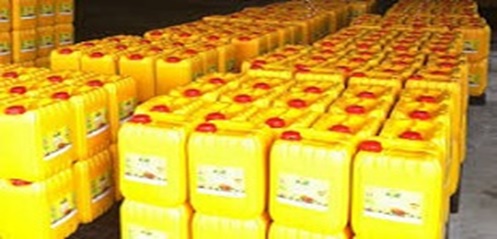
BY ABEBE WOLDEGIORGIS
In the last two years new huge edible oil manufacturing and refinery industries were installed and inaugurated with the presence of higher federal government officials including Prime Minister Abiy Ahmed. The starting of production of the industries brought a glimpse of hope for many because it was assumed that shortage of supply of edible oil and price inflation in the market would be eased once and for all.
Ordinary citizens expected that the commencement of production of edible oil by the new factories will avail the products to the market with the fair price, eases long queue in consumers’ cooperatives associations’ shops. However, the situation was end up with the other way round. As time passed, consumers even were unable to find palm oil from their shops in their woredas or kebeles. The five litter liquid edible oil made up of sunflower price even had rose to 1000 Birr.
Kassahun Follo is the President of the Confederation of Ethiopian Trade Unions (CETU). As to him, the price of oil and other basic needs is beyond the purchasing capacity of the working class especially the low income ones.
“Currently, the workers are getting hard to meet their meal even once a day. They are burdened with the higher living cost and their income does not go in line with the high price hike.” He further said that the outbreak of COVID -19 three years ago put pressure on their day to day living.
In addition to these, due to the ongoing political crises induced by the war in the northern part of the country and the international economic crises, the situation is being exacerbated from time to time.
According to Kassahun, price hike both on commodities and services is witnessed by weekly base but the workers’ salary does not show any increment. Even though the inflation rose to around 40 percent, no measure was taken to balance the difference.
In other countries, however, when such price hike is happened, salary increment for the lowest paid workers will be taken as a remedial action. Minimum employment wage of workers also will be revised. “However we never see such salary adjustment based on the rising of the living cost,” Kassahun said.
According to an expert working in the Consumers Rights Protection Association, the price increment witnessed in various commodities has no any genuine reason rather artificially created by few greedy business men.
Some self- centered traders also took the Russia –Ukraine war as pretext to set new prices particularly on construction materials. Other traders also set new commodity prices by disseminating false information to the public as if shortage of commodity supply is imminent.
Study conducted by Food, Beverage and Pharmaceutical Industry Development Institute indicated that, currently 206 edible oil cottage industries of which 26 of them are fully equipped with refinery and have a capacity to produce 100 kilo per day are operational.
The installation of five new industries with the capacity to refine palm oil raises the number of industries to 232. If these manufacturing industries produce edible oil in their full capacity, they can meet the demand at national level.
However, due to various, reasons they are unable to produce with their full capacity. as the result, the nation is forced to import the products from abroad. Raw materials which serve to produce liquid sun flower oil and palm oil are also imported which in turn incur additional cost in hard currency to the nation, Mushe Semmu, an experienced banker said.
The problem not only surfaced itself in such manner, oil products whether it is locally produced or imported has not passed through proper inspection in the market. The newly inaugurated oil industries were intended to resolve shortages of supply but due to various reasons they unable to do so.
According to the Ethiopian Food, Beverage and Pharmaceutical Industries Institute, in the 2020 budget year the nation’s total edible oil annual demand was 258, 973 tons and to cover the cost the government spent 372.4 million Dollar whereas, in the year 2021 the nation imported 1.O6 million tons that cost 628.9 million Dollar. However, by the year 2022 it was intended to substitute the imported oil products by the local one. The oil demand by 2021/22 budget year was projected to be 906.5 million tone and it was intended to substitute 839.40 tone products by the local one but the industries are unable to fulfill it.
As a result, shortage of the product has become pervasive and nation is forced to increase its importation of the products.
As to Mushe, there are various factors that can be mentioned as the aggravating causes for the shortage of edible oil. Lack of trust building on locally produced oils and the importation of unrefined oil raw materials to utilize as input also should not be taken as a long lasting solution. He further said that, the nation has sufficient land which can be utilized for palm tree production but unable to do so incur the nation additional hard currency for the importation of oil.
Five years ago when six local companies got license for the importation of edible oil, it was intended to produce the oil through planting palm trees here within five years but it was in vein.
In addition to these, years back, the government led by the EPRDF intentionally distributed oil products to the market which were imported in the form of aid from donors. As a result, the local manufacturers had been weakened and collapsed that in turn created gap in the supply chain. And the current problem is directly related with that malpractice. The aid oil which came inland incapacitated the local industries.
Some residents of the Capital City also said that a decade ago, they purchased and consumed locally produced oil made up of nigger. That time, numerous cottage industries were located here and there. The product was conducive for cooking food. As to them, the closing down of such cottage industries can be mentioned as among the major cases for the shortage of the products in the local market.
As to Mushe, the closure of cottage oil industries forced the nation to be dependent on the importation of palm oil which some blame for risking cholesterol. He further said that, chickpea and nigger which are sufficiently produced locally must be utilized as inputs in local industries instead of exporting them.
“Population growth necessitates the increasing of demand and by considering this, the government should work hard to meet the demand,” Mushe said. As to him, previously the government engaged in importing oil products but later on, it gave up and handed over the importation task to the selected companies by marginalizing the small and medium size companies engage in the importation and such measure gave a monopoly power for few companies which in turn posed market distortion.
According to the information obtained from the newly established oil manufacturing, the firms do not engaged in their full capacity because of the absence of sufficient hard currency in banks which they spend to import raw materials used as inputs.
According to the Shemu Oil Factory Communication Director Tedros Tadesse, because of shortage of hard currency, currently his factory produces by its 30 percent of the capacity. However, even though it produced by its 30 percent production capacity, it distributes its products to consumers through cooperative associations. Both Shemu and Febela oil factories supply their one litter oil products by 83 Birr. In the recent weeks five litter of sunflower edible oil was sold by 1350 Birr and one litter by 220 Birr. This indicated that, the price hike witnessed only in sunflower products of oil and it does not comprise palm oil.
The palm oil which is consumed by the ordinary citizens is found in the consumers’ association shops and five litter of it is sold by 450 Birr but sufficient products are not supplied as per the demand, it was learned.
The Ethiopian Herald March 29/2022





